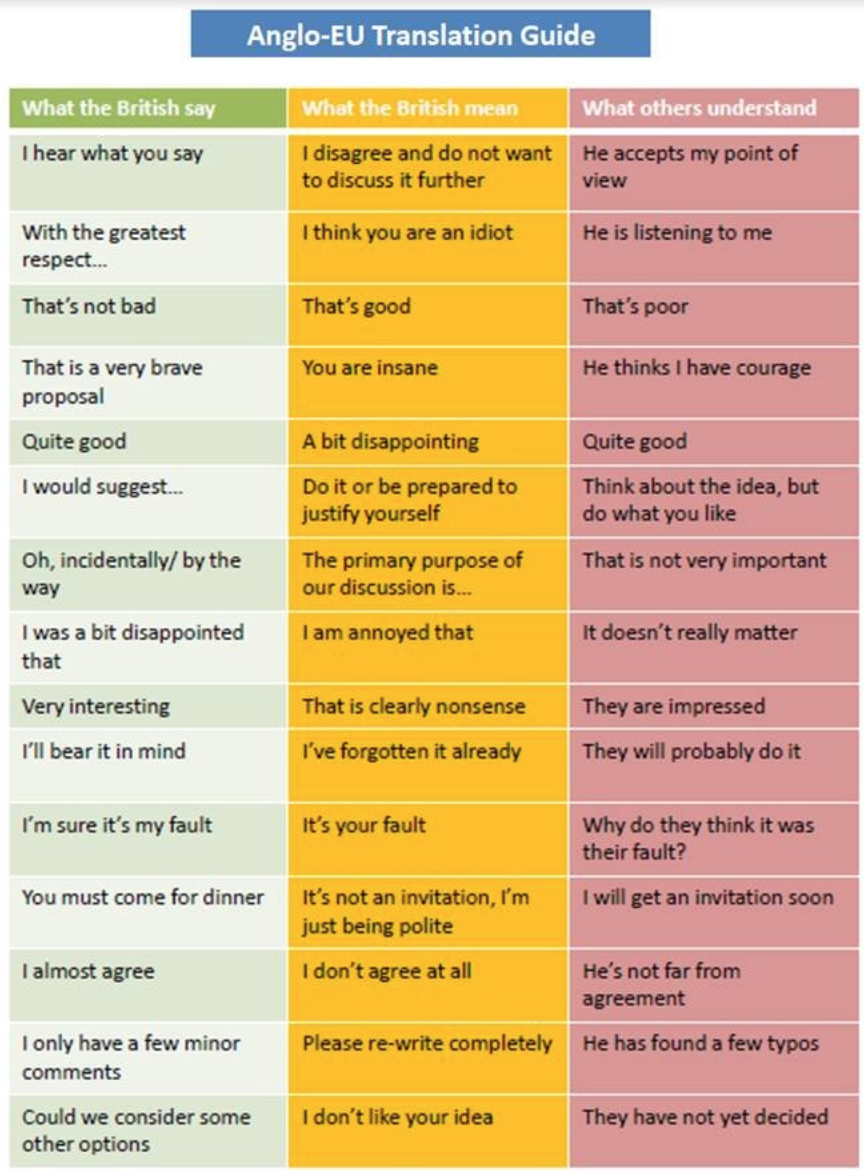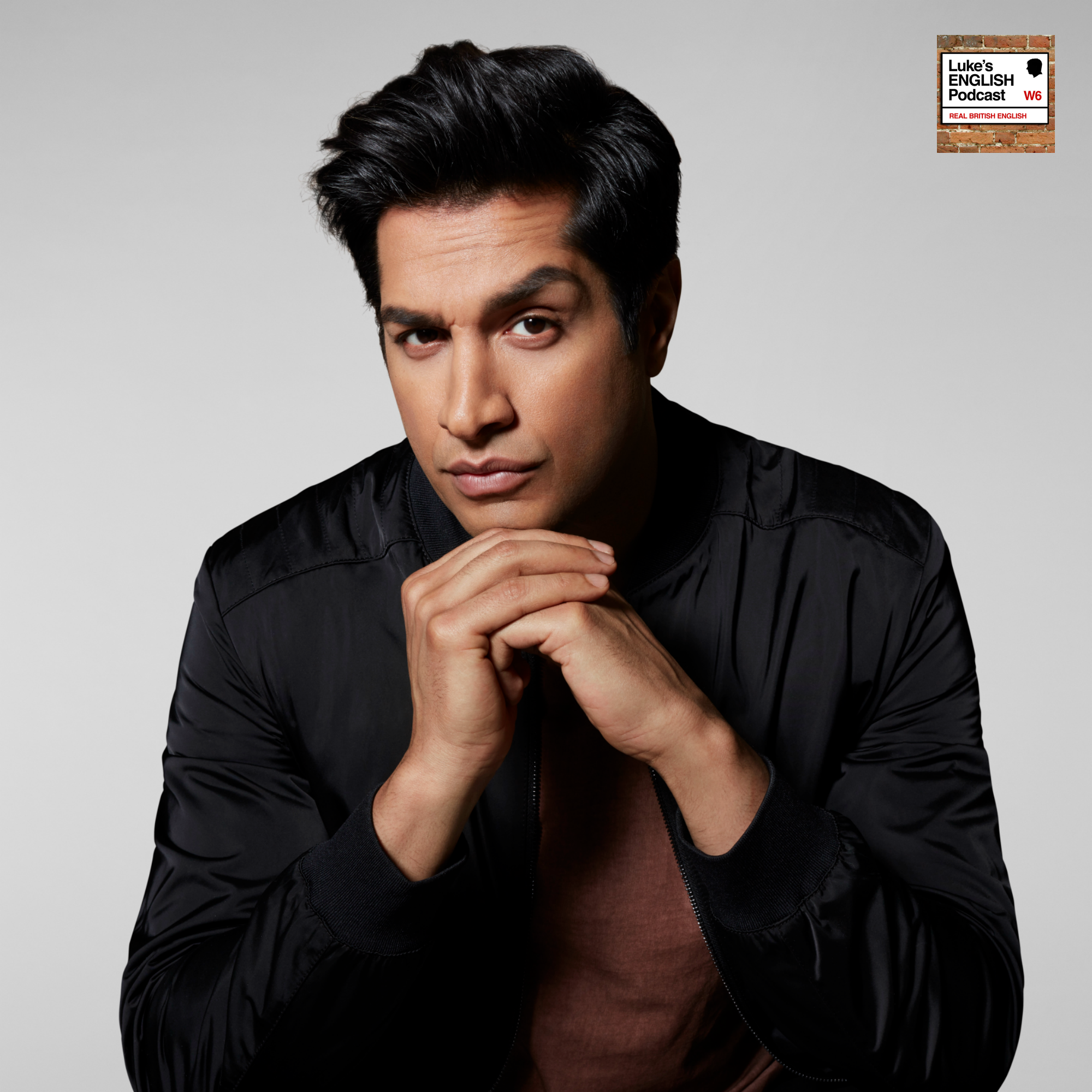Examining British communication style and debunking a few myths about how British people communicate. This episode is based on a famous infographic called “What British People Say vs What They Really Mean” or “The Anglo-EU Translation Guide”. It contains lots of thoughts about how direct and indirect cultures communicate with each other, and some samples of business English, with a few improvised scenarios too! Transcript available.
[DOWNLOAD]
Transcript (below)
In this episode I’m talking about an infographic which is often shared online called “What British People Say vs What They Mean”. In the infographic there are three columns. One with sentences typically spoken by English people. The next column has what, apparently, British people really mean, and then the third column shows us the perceived meanings of those sentences by foreigners. It is supposed to highlight the indirectness of British English speakers and the how people from direct cultures often misunderstand us.
I’m going to go through the graphic line by line, discussing the language, talking about the indirect communication style of British people and discussing to what extent this infographic is true and how much is a stereotype.
This relates to several conversations I’ve had in episodes in the past, namely the ones about cultural differences with Amber & Paul, British humour with Amber and the one about language & culture with Alex van Walsum.
This chart often pops up online. You might have seen it. It’s shared on Facebook or Twitter, and people send it to me by email. People send this to me all the time, often accompanied with the question “Is this true?” It’s probably the infographic that I’ve seen more than any other. A while ago I shared it on my Facebook page and it got a big response with thousands of people seeing it and loads of comments.
The chart is anonymously written. It may have first appeared in an article on the Economist’s website. Apparently some people say it originated in a Dutch company that had dealings with the UK, which is interesting because the Dutch are known for being very direct in their communication, so through their eyes the Brits might seem excessively indirect. The infographic is sometimes entitled “What British People Say vs What They Mean” or the “Anglo-EU translation guide”.
Basically the chart presents a list of utterances, which it presents as typical things the British say in business situations, and then two other columns which represent what British people really mean when they say those things, and then how other people actually understand them to mean something quite different.
I think it’s based on communication and cultural differences between the UK and European neighbours. The underlying cultural difference is that in the UK we have an indirect communication culture, particularly with regard to saying negative things, and tend to signal their disapproval, disappointment, disagreement or offence in other ways – either by minimising the negative part, or using euphemism, which may be hard to understand to the untrained ear.
In my experience as an English person living in France, I find that it is definitely true that we have slightly different communication styles as a result of our cultural differences. But they’re just slightly different really.
One example of a difference between France and the UK is that generally in the UK our first interaction with people – especially people in service positions, e.g. if you’re going to the post office to collect a package which you’ve been told is there even though last time you went they claimed it definitely wasn’t there. So you have to go back and kind of complain and make them look again. In the UK my normal way of doing it would be to approach the situation in a nice way, using friendliness as a social lubricant to help things go more smoothly. Like “Sorry to bother you again! I went to the other post office and they told me the package is definitely here. Could you have another look for me? Thanks!” You kind of talk to that person like you understand how you’re personally putting them out, but between the two of you there is a friendly understanding. You’re nice to the person, even though technically they’re wrong and you’re sort of making a complaint. That’s how it goes much of the time – not every time of course. Often when Brits are unhappy with a service they will complain about it very directly. But many times you’ll see or hear Brits being pretty friendly when dealing with people in impersonal situations.
Now, that might actually be perceived not as a nice, informal gesture – but as fake, and two faced because in fact you’re actually not happy with the situation and you don’t know them personally, so why are you being all chummy?
In Paris, your first interaction would typically be a bit more formal and also a bit less friendly. If you’re all nice and friendly and you smile, you might be perceived as weak. That’s not to say that French people don’t smile – of course they do, but in that kind of service situation where you are making a complaint you’re likely to be serious and with a straight face. You can be completely straight about it and bring your unhappiness to the table. It’s normal to dig your heels in and argue a little bit before things then turn into a more amicable arrangement. It usually ends well, but there’s a bit of conflict at the start, for example saying “no” or “it’s not possible” at the beginning, before deciding later to ‘make an exception’.
I refer you to the episode with Alex Van Walsum who sums this up really well.
http://teacherluke.libsyn.com/391-discussing-language-culture-comedy-with-alexander-van-walsum
Episode 391 – play the bit
If you’re nice and you compromise from the start they’ll walk all over you without even realising it. So there’s conflict at the beginning until the thing finally gets resolved, and later on a relationship of trust might develop from the problem being fixed, but it comes after. I’m not saying in the UK we’re never direct or angry in that situation, or that in France people are never nice at first, I’m just saying in my experience it pays to be more formal and tough at the beginning or you’ll be taken for granted. Whereas in the UK my approach would be a bit different.
Sometimes this difference gets the better of me. I might go to a restaurant and say “Do you have a table for two at 8?” and the guy says “It’s complicated” or “No, it’s not possible” and I smile and say “OK, that’s a pity, thanks for your help!” and then leave. But what I often don’t realise is that “No, it’s not possible” is just the starting point. What you should do then is wait and just not take no for an answer. Wait and say “Is there anything you can do?” and dig your heels in a bit. Often, after a bit of digging, you might get a result. But you have to push through a little barrier first in many cases.
The point is that the words we use and the messages we convey are often quite different, and messages are often subject to various cultural codes which allow the people involved to truly understand what is being said vs what is the intended meaning, or illocutionary force of something.
Or more simply, in indirect cultures we don’t always say exactly what we mean, and it depends on the other person to decode the intended meaning of our messages. This is more common in some cultures than others, and this kind of indirectness does have a social function. If you’re from a direct culture, you’re less likely to be able to decode the messages and that’s where the misunderstandings happen.
That brings us to this chart of what British people say vs what they mean.
This chart essentially targets this cultural and linguistic point quite specifically, and while there is truth in it, I think the chart is not completely accurate.
Nevertheless, let’s go through what Brits say vs what they mean and see what we can learn.
One of the most important problems with this chart is the lack of context and the fact that these are spoken phrases written down, so none of the intonation is included. Intonation and context are vital in the way these messages are delivered and understood.
Without the context and intonation, this chart makes Brits look incredibly devious and two-faced. It also makes other people seem pretty dumb and naive.
On balance, what do I think of this?
It’s exaggerated. Brits are not as stuffy, awkward or unable to say what we mean as this seems to suggest. It’s slightly old fashioned too.
Also it’s not really fair on foreigners who aren’t that stupid.
I think it originally came from the Netherlands (who we do most of our business with in the EU) and they’re known for being a very plain talking, direct culture. So, this is perhaps from the dutch point of view, which exaggerates things further.
There is a point being made too, which is that the English say the opposite of what they mean, which is not true. Direct cultures tend to view indirect ones as being two-faced, hypocritical and even duplicitous. We do speak indirectly, perhaps downplaying negative things and attempting to use tact and diplomacy but it doesn’t stretch to being deceitful. For the English it’s a way to keep things nice and to sugarcoat our formal relationships. It’s a respectful distance which has been in the culture for a long time. We might be a bit indirect by dutch standards, but we know what we’re talking about. We understand what each other means, because we know the codes. So it’s a functional communication system, and just another way to share ideas while getting on at the same time.
Another point is that you could argue that it’s specifically English, rather than British because there is a slight cultural difference between the English and the Scottish, Irish, Welsh and even Cornish people, who might be more direct. Anyway, I know plenty of English people who are perfectly capable of being direct and saying exactly what they mean.
Also, there may be a class issue here. I think this relates to certain kinds of middle class or upper class English people, who tend to communicate like this, especially in a formal situation. There are certainly plenty of English people who are very direct in their communication style.
The situation is also important. Most of these phrases are used at work where diplomacy is important. In social situations these same people might be extremely direct, for example with friends who you make fun of and speak to without any kind of filter.
The sentences are out of context, so it’s not obvious how the phrase is intonated or what other phrases are used around it. Written down like that it has no nuance and can make the Brits look like pretty awful. So, this graph is designed to make people laugh and illustrate a tendency for Brits to be a bit indirect, but it is by no means a flawless guide to British communication style.
It’s a bit black and white. In fact there are plenty of UK individuals who are more direct than this, and EU individuals who are indirect. It’s a bit “them and us”, a bit ‘black and white’ and therefore a bit unfair.
It’s not just Brits. There are plenty of other cultures or individuals who also communicate like this. Canadians, for example, are well-known for having a polite and indirect communication style.
While there is definitely an underlying point being demonstrated by the chart, taking it on face value makes British people seem insincere and sneaky – which is a common criticism of us by European people with direct communication styles. Whereas us Brits see our communication style as diplomatic and avoiding conflict and essentially all about being nice, other people think we are not being honest, straight or sincere. We just don’t want to be too negative or nasty, but we come across as being unsure of ourselves, weak or untrustworthy. Equally, from the other side, Brits think the French can be wilfully difficult, stubborn and problematic because of how direct they are with negative comments. We also find the Germans – who tend to state things exactly as they are, to be cold and humourless with their ultra-pragmatic approach which doesn’t involve much small talk or ‘window dressing’. It’s tricky isn’t it!
In English we like to sugarcoat things. Not every culture does that. Some do it more than us.
Of course it doesn’t always go like that and most of the time communication happens without problems and it’s all fine. For example I have had many many exchanges with people from many different cultures including those from direct cultures and they’ve been absolutely lovely, but then again I am quite culturally aware and able to minimise this sort of thing by recognising the importance of saying exactly what you mean. I imagine that when people from other countries do business with Brits who are not used to cross cultural communication that sometimes there is friction and it’s often related to these cultural differences.
Also, it could be related to writing style in emails where this kind of thing becomes so much more obvious. I can imagine foreign people receiving English emails and wondering what exactly the person means – like the example of my wife and the castle.
For example, apparently when the German company BMW took over the British car manufacturer Rover, it took ages for BMW to fully understand the extent of the problems at Rover because all the British staff minimised the problems or spoke in slightly vague euphemisms. The Germans were not able to decode the embedded negatives within the Brits’ responses.
E.g. “We’ve had a few slight issues on the production line. Staff have expressed some preference for a longer break during the afternoon shift.” How big are those problems on the production line exactly? It would probably be worth investigating them further rather than assuming they are just “a few slight issues”.
Overall, I think there is truth in this chart, which is why it’s such an enduring success online, but it’s not totally true. The truth is that Brits put a positive shine on things as a social lubricant (sugarcoating) and it works within indirect cultures, whereas direct cultures say things as they are which can make them seem unfriendly or cold hearted yet ultimately more sincere. Neither approach is better than the other, they’re just alternatives.
Really, it’s about context. With indirect cultures, the indirect style probably feels more natural, with direct cultures it’s the other way around. The problems arise when the two cultures get together and then misunderstand each other. For the chart, more perspective and context is required to really understand what’s going on, and to avoid knee-jerk reactions. I say knee-jerk reactions – these are sort of quick, instant responses that happen without thoughtful consideration (like when a doctor taps your knee and it jerks forward without you thinking about it). Those things might be to conclude that Germans have no sense of humour, French people are willfully difficult and don’t want to work, English people are hypocrites who don’t say what they mean.
Simple binary comparisons of language without context like this can foster unbalanced opinions which can lead to or reinforce resentment and things like that. The final point is that despite our communication style, we’re still just as fair-minded, honest, trustworthy, narrow minded, dishonest and untrustworthy as anybody else! Don’t jump to conclusions and never let cultural differences cause you to make fast judgements about people without seeing the whole picture!
“The British are too polite to be honest, whereas the Germans are too honest to be polite.”
Source: http://www.bbc.com/news/world-europe-13545386
Get the full word-for-word transcript here 👇


 Britain’s first insect restaurant opens
Britain’s first insect restaurant opens


 Hello, welcome back to the podcast. Here is part 2 of my conversation with Canadian multilingual stand up comedy sensation Sugar Sammy.
Hello, welcome back to the podcast. Here is part 2 of my conversation with Canadian multilingual stand up comedy sensation Sugar Sammy.

